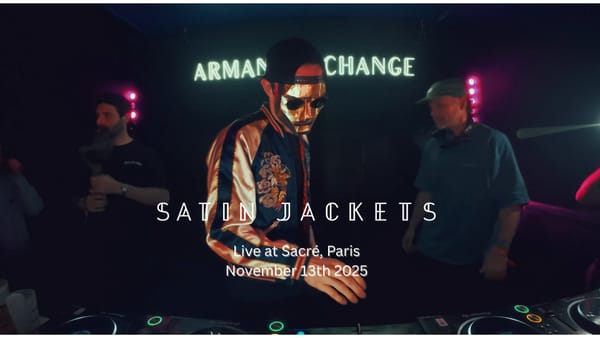The Currency of Sound

Thoughts on the Artist’s Balancing Act.
There is a romantic myth that artists should live and die by their muse alone, that money, contracts and percentages are distractions best left to the people who know their way with it. It sounds comforting, even noble. But more often than not, it is the opening line in a long story of lost rights, recoupment traps and deals that glitter just long enough for someone else to cash in.
The truth is harsh but simple. An artist who wants to survive long term has to be business minded. Not because it is enjoyable. Not because creativity and commerce naturally belong together. They rarely do. But if your career does not work economically, it eventually does not work at all. A song might be timeless, but rent and groceries are not. Some artists might come from a background where these trivial financial realities might not apply to them but let us assume you are not one of them.
That is where the balancing act begins. The creative mind dreams in chords and moods, while the business mind deals in numbers and legal terms. One is driven by inspiration, the other by self preservation. And yet both have to coexist if you want to keep making music on your own terms.
It is possible to surround yourself with people who handle the business. Managers, labels and publishers all promise to take care of the dull stuff so you can stay in your studio realm. But the music business, for all its glamour and nostalgia, remains a business of brigandage. Everyone along the food chain takes a cut, and if there are too many mouths feeding off your work, there might not be enough left for you at the end.
That is why aligning interests is crucial. A label wants to maximise profits just as much as you do, although their idea of success may not look like yours. Advances, for instance, can seem like a lifeline but often they are simply a way to bind the artist. You receive a sum upfront, sign away rights for a certain period, and before you know it, your freedom is tied to a contract until the advance is recouped. Sometimes that point takes a long time or even never comes. The rights, however, are still gone.
This brings us to contracts, those cryptic documents that can decide the fate of years of your work. A good rule of thumb is that if a lawyer wrote it, and they usually do, you should have your own lawyer check it. The other side’s attorney was hired to tilt every clause in their client’s favour. Only another professional can tell where the balance can be redrawn without shattering the deal. It also enables you to make a conscious decision if you want to go forward with the deal or pass. There is no shame in the latter even if it feels like you let an opportunity slide. One door closes but another one might open up eventually.
A good music lawyer is not cheap, and you will not find them through a quick search online. They usually come through recommendation, a word from someone who has been through it before. But they can be worth every cent. A single well negotiated percentage point or a clear reversion clause can repay their fee many times over.
When choosing partners such as labels, managers or distributors, do not only look at their creative pitch. Ask how their accounting department works. Those are the people you will be dealing with long after the showcase dinners and friendly emails are over. Your music rights are your bank account, and like any asset, you should know when they revert to you. The sooner, the better. If a deal doesn‘t live up to your expectations, you will want to be able to pack up your things and move on. That kind of freedom takes leverage, which most do not have at the start, but you build it by staying alert.
The emotional side of all this is often overlooked. Creative people resist business thinking not because they are naive, but because it can feel like stepping into a minefield. Negotiating, monitoring royalties or reading financial statements demands a different kind of attention. It can drain the same mental energy that fuels songwriting. The ability to shift between those two modes of thinking is a skill to master. Some artists learn to protect their creative time and treat business hours like studio hours, both necessary and equally sacred.
In recent years, a new kind of artist has emerged, the self-managed and self-released musician who handles everything alone. This independence is empowering but at the same time exhausting. It requires not only creativity but also an understanding of marketing, data, budgeting and long term strategy. The modern artist has become their own label, promoter and analyst. It is a freedom that comes with responsibility.
Streaming platforms have made numbers part of the creative process. Data now informs decisions once made by instinct. Skip rates, saves and playlist placements can tempt artists to adapt their sound to fit the algorithm. Some call it a feedback loop, others a trap. The challenge is to use that information without letting it dictate your art. Metrics can guide, but they should never lead.
Another topic worth addressing is the idea of the team. Every manager, label or publisher will talk about being part of the same family. In truth, each party has its own incentives, its own goals and timelines. The team exists only as long as interests align. Recognising that early helps maintain a clear head when the contracts and compliments start to flow.
Ownership is another pillar that deserves attention. Catalogs have become one of the most valuable assets in modern music. Artists are now selling their rights for sums that would have seemed unimaginable a decade ago. That shift has made one thing clear: long term ownership can far outweigh the short term benefits of a quick deal. Your rights are your pension, your legacy and often your best leverage.
Yet business in music still runs on trust. The best deals often happen through reputation and relationships. People work with those they believe will deliver and behave ethically. In a culture obsessed with data and hype, trust remains the real currency. A good reputation is slow to build and quick to lose. There are some people you can trust. It's imperative to find them and maintain the relationship.
Education also plays a growing role. Many artists still learn the hard way through bad contracts and missed royalties. But that is changing. Workshops, mentoring programs and online communities now help musicians understand publishing, streaming and copyright. A more informed generation is emerging, one that sees business knowledge as part of the creative toolkit rather than its enemy.
Complete independence, however, is not always the answer. Freedom can be paralysing when there is no structure or feedback. Sometimes a fair partnership can create the stability needed to take creative risks. The key is knowing when to share control and when to protect it. A healthy deal is one where both sides can win without one side feeling owned.
If something feels off during negotiations, listen to your gut. Ask questions. If the answer does not make sense, there is a reason. Contracts are not meant to be incomprehensible, and a promise that sounds too good often is. Never sign what you do not understand or what feels wrong, no matter how tempting the offer.
It may seem like a lot, and it is. But at the end of the day, no one will ever care about your career as much as you do. Success is not just about writing great music. It is about protecting the space to keep doing it. The business does not have to kill the art, but only if the artist learns how to keep the business in check. In this industry, creativity might light the fire, but it is business sense that keeps it burning.





